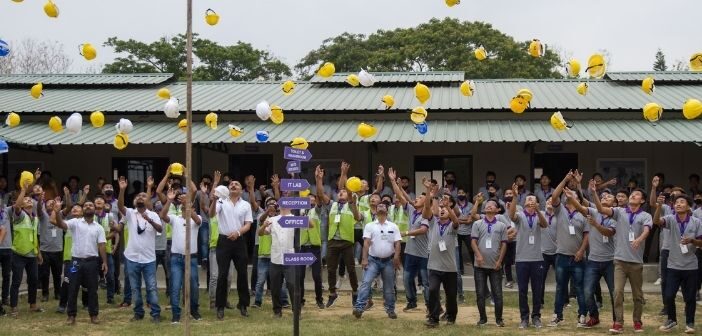
GlobalPeers Skilling and Development Initiatives Pvt Ltd (GPSDI) is an organization which aims to convert India’s demographic dividend into skilled assets. Currently, GPSDI has one training centre in Nagaland and aims to establish more centres in North East India in the future. Established in 2014, the organization is contributing to the growth of our country and producing skilled manpower through its scalable, responsive and self-sustainable training and skilling initiatives.
To know more about the training centre and the skill development initiatives, team NSN caught up with Mr Rohit Chandra, Chief Executive Officer (CEO), GlobalPeers Skilling and Development Initiatives Pvt Ltd (GPSDI).
In this Skill Story, Mr Rohit Chandra shares about the self-sustainable training and skilling initiatives by GPSDI and the challenges faced by the training centre due to Covid-19. Read on to know more.
Q. Please tell us more about GlobalPeers Skilling and Development Initiatives Pvt Ltd (GPSDI), initiatives and achievements.
A: GPSDI was established in Delhi in 2014. It subsequently shifted its headquarters to Dimapur, Nagaland focusing on developing state of the art training centres across the North East where there is a wealth of talented and gifted human resources waiting to join the national workforce.
GPSDI focuses on imparting technical skills that will enable people to be employed. Most of the trainees of our organization are school dropouts. It is led by an experienced and professional team that has set up its first modern greenfield skilling institute at Sovima village, Dimapur near the ICFAI University.
Our organization has been able to provide placement to over 80% of its first batch of Masons and Bar Benders. The rest of the students preferred to take up self-employment opportunities in and around their villages.
We have also launched a Services and Project division which offers paid services to general public for construction-related activities by employing candidates trained at the training centre. Besides earning much-needed revenue for this capital-intensive training, the projects also provide “live” opportunities for trainees to hone their skills and develop confidence.
Q. How many centres do you have in India and what are the key skills you focus on?
A: Currently, we have one training centre at Dimapur, Nagaland. We are planning to set up additional training facilities in other districts of Nagaland followed by similar training centres in other states in the North East, as well as carry out RPL (Recognition of Prior Learning) assessment, training and certifications for locals already working in the construction sector.
We focus on technical skills like construction skills, mechanical skills for fabrication works, maintenance and repair work for machines and equipment etc. and our first training centre is focused on construction-related skills.
We have also launched six month long courses with a high emphasis on practical training and industry internships under the Ministry of Rural Development’s DDUGKY program. Besides traditional practices, the training also includes contemporary developments in construction like RCC interlocking blocks and Paver blocks. There is a high emphasis on the quality of trainers and most trainers are graduate civil engineers or diploma holders with vast national and international experience. All trainers are trained and certified by the respective Sector Skill Councils.
Q. How has Covid-19 impacted the training and what are the challenges that you have faced so far?
A: The entire educational, training and skilling eco-system has been very adversely affected by the Covid lockdowns. Some of the major challenges for GPSDI are,
- Maintaining complete infrastructure and staff during lockdown
- Similarly, conducting training with reduced batch strength, necessitated by covid guidelines
- Mobilisation of trainees is a very difficult task during the covid outbreaks since March 2020
- Getting trainees back for training after a mid-term lockdown
- The medical cost during training has substantially gone up as every case of even minor illness cannot be taken lightly
 Q. How are you ensuring continuous skill development and placements in the present scenario? and what are the challenges in that?
Q. How are you ensuring continuous skill development and placements in the present scenario? and what are the challenges in that?
A: The biggest challenge in the current scenario is the difficulty in mobilization and high cost of maintaining vacant training centres as well as training of reduced batches. However, we have been continuing the mobilization as well as training activities following all the guidelines by the government and local administration.
The placement has been a challenge largely from the perspective that the trained candidates are more interested in returning back to the safety of their villages and unwilling to take up jobs due to the covid related uncertainties.
To address these issues, we have tried to build more trust with the candidates by assuring them better care and hospitality at the training centres in case of any sickness. We have also discussed these issues and the trainees’ health concerns with potential employers and taken assurances from them regarding proper care and coverage in any such eventuality during the employment.
We have also provided dedicated safe transport for the trainers and staff coming daily into the training centre from their homes, to reduce the incidence of infection during training at the training centre.
Also read: This international organization empowers people through promotion of work-based learning https://nationalskillsnetwork.in/this-international-organization-empowers-people-through-promotion-of-work-based-learning/
Q. Anything else you wish to share with our readers
A: Despite a literacy rate of 80%, Nagaland has the highest unemployment rate (21.4%) in India amongst all states and UTs. For one, there are hardly any local employment opportunities due to the dearth of industrial activity. Secondly, whatever opportunities are there, the majority are taken up by workers from outside the state.
After agriculture, construction is the sector providing maximum jobs in the state. If carefully leveraged, the construction and infrastructure sector has huge scope to create a large number of jobs in the state. The right skill development and training would help the locals a lot to leverage the opportunities.
We have recognized and ensured the following, in our training centres, as being essential for a successful skill development project,
- Selective mobilization
- High quality of Trainers
- High quality of training infra
- Good training content and correct pedagogy
- Very high emphasis on practical training for each trainee
- Regular assessments to identify weak candidates and additional effort to bring them up to speed
- Commercial/Market/Industry environment for OJT
- Placement linkages for effective placement
Despite the challenges in the current scenario, GPSDI continues to provide skill development training to the youth of Nagaland. The scalable and self-sustainable training and skill development initiatives are helping the local youth to build a career in industries like Construction and Infrastructure. The organization is planning to establish more centres in the North East region to empower the local youth by ensuring their employability.













